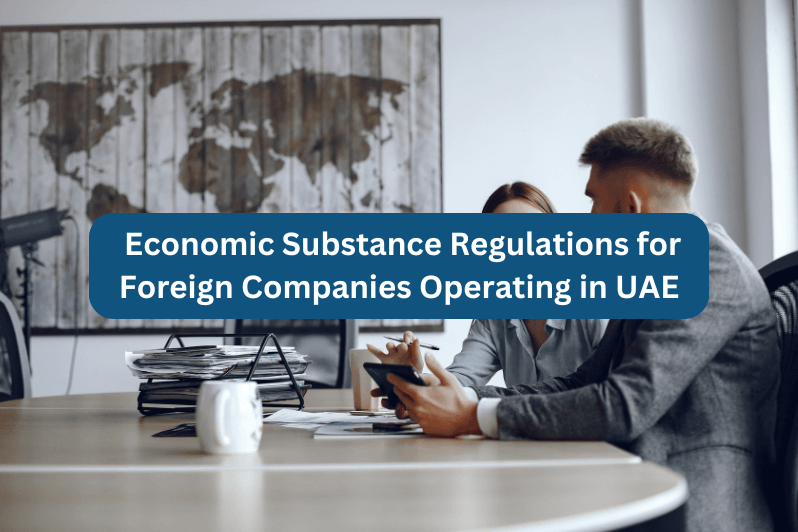The Economic Substance Regulations have been implemented by the UAE to underscore its dedication to international tax transparency and to guarantee that businesses functioning within the UAE possess a bona fide economic presence in the nation. This article seeks to furnish a comprehensive overview of these regulations and their ramifications for foreign enterprises operating in the UAE.
Effects on Foreign Companies
Economic Substance Regulations requirements in UAE include:
- Economic Substance Test: Foreign companies that carry out Relevant Activities must satisfy the Economic Substance Test (EST) to demonstrate that they have sufficient economic substance in the UAE. The EST requires companies to conduct their CIGA in the UAE, have adequate resources, premises, and employees in the UAE, and incur adequate operating expenditure in the UAE. Companies that outsource their CIGA to third-party service providers in the UAE must ensure that these providers have sufficient economic substance in the UAE.
- Notification and Reporting Requirements: Foreign companies that carry out Relevant Activities must notify the relevant regulatory authority of their Relevant Activities and submit an annual Economic Substance Report (Economic Substance Regulations) to demonstrate compliance with the Economic Substance Regulations. The Economic Substance Regulations must include detailed information about the company’s Relevant Activities, CIGA, resources, premises, employees, operating expenditure, and financial statements. Companies that fail to submit their Economic Substance Regulations on time may face penalties, including fines and suspension or revocation of their licenses.
- Hiring qualified employees: To meet the regulations’ requirement of having an adequate number of qualified employees in the UAE, companies may need to hire new local employees with the necessary expertise and qualifications. This could increase operational costs.
- Relocating management functions: For activities like holding companies and headquarters, the management and control of companies needs to be demonstrably conducted from the UAE. Some multinationals may need to relocate certain management functions from their home country offices to the UAE to comply.
- Substance over form: The regulations emphasize substance over legal form. Even if activities are conducted through a UAE entity, the economic substance tests around employees, expenses and management need to be satisfied within the UAE. A mere “letter-box” presence will not suffice under the new rules.
- Impact on tax residency: Failure to meet the economic substance requirements could result in a company losing its tax residency status in the UAE. This has implications like exposure to double taxation if the parent jurisdiction also views it as tax resident there.
- Oversight by tax authorities: The UAE Federal Tax Authority has been established to oversee compliance with the regulations. Entities need to file economic substance declarations and subject themselves to scrutiny and potential audits by the tax authorities.
- Penalties for Non-Compliance: Failure to comply with the Economic Substance Regulations can result in penalties and the exchange of information with foreign competent authorities. Penalties may include:
- Administrative Fine for Failure to Submit Notification: AED 20,000
- Administrative Fine for Failure to Submit Economic Substance Report or Failure to Meet the Economic Substance Test:
- First offense: AED 50,000
- Second consecutive offense: AED 400,000
- Penalty for Providing Inaccurate Information: AED 50,000
- License Suspension, Revocation, or Non-Renewal: For serious cases of non-compliance or entities that are repeat offenders, the National Assessing Authority may impose additional administrative actions, including the suspension, revocation, or non-renewal of the license of a Licensee or an Exempted Licensee.
- Sector-specific implications: The implications vary depending on the specific sector and relevant activity:
- Banking and insurance: These sectors need to demonstrate that risk and portfolio decisions are made in the UAE; local boards meet regularly; and adequate full-time employees with relevant qualifications are present.
- Fund management: For asset managers, investment decisions and portfolio management need to demonstrably take place in the UAE. Having only marketing staff may not suffice.
- Holding companies: Holding passive intellectual property rights or shares may not meet requirements without additional active business operations managed from the UAE.
- Shipping: For ship-owning companies, there must be adequate UAE-based staffing and accounting functions to justify the tonnage tax regime.
- Intellectual property: For IP holding companies, active R&D, product development or value addition related to the IP needs to occur via a sufficient local workforce.
- Headquarters: Strategic decision making, business development, finance, marketing, HR and administration functions must demonstrably be carried out from the UAE.
In conclusion, complying with the Economic Substance Regulations can be a complex and challenging task for foreign companies operating in the UAE. It is essential for these companies to seek expert advice from ESR consultants who can help them navigate the regulatory landscape and ensure compliance with the requirements. By doing so, they can avoid penalties and maintain their reputation, while also demonstrating their commitment to transparency and economic substance in the UAE.
Read More: Economic Substance Regulations (ESR) for Distribution & Service Centre Business in UAE

